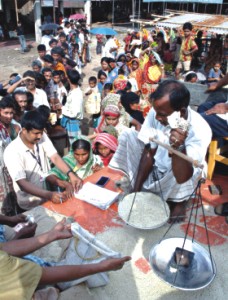| View from the Bottom
Hidden hunger, Hidden Anger
Shahnoor Wahid
Sulaiman Mia managed some money and came to Dhaka from a remote village of Ulipur upazila under Kurigram district. He came to meet his young daughter working as a housemaid in a house in Banani. The employer, unusually nice people, gave him breakfast in the morning and rice with a big piece of fish, some vegetables and plenty of daal for lunch. Sulaiman Mia ate to his heart's content after a long time. He is a poor man and work does not come by that easy in the entire region where he lives. Many nights they just chew on a coarse rooti (hand made bread) and gulp it down with water. They try their best not to think about food. Sleep is the best healer.
 He had fathered five children without even realising how he would feed so many mouths. He began to sell off small pieces of land that he had inherited from his father. By the time he reached 35 he could hardly carry any load on his shoulders. He has become old and incapacitated at the age of only fifty because of hard menial work he had to do in his younger days to earn a living. His bones would simply break apart. He sent off his three daughters to Dhaka to work in some garment factories under the guidance of a local woman. The youngest one is the one who works in Banani. He had fathered five children without even realising how he would feed so many mouths. He began to sell off small pieces of land that he had inherited from his father. By the time he reached 35 he could hardly carry any load on his shoulders. He has become old and incapacitated at the age of only fifty because of hard menial work he had to do in his younger days to earn a living. His bones would simply break apart. He sent off his three daughters to Dhaka to work in some garment factories under the guidance of a local woman. The youngest one is the one who works in Banani.
After having his meal at night Sulaiman Mia talked with his daughter for a while and then turned in. His loving daughter switched the light off and closed the door behind her. In the middle of the night Sulaiman realised that he was having digestion problem. He went to the toilet a number of times and felt very cold. When his daughter came to the room in the morning he told her that he was having stomach ache and diarrhoea type symptoms. His daughter told him that it would go away. But it didn't. He couldn't eat anything that day. When his daughter told her employers about it, they immediately gave him some saline and medicine. By next morning he began to feel better and could eat some soft food.
The employers had a talk with their family physician about the case and he explained that the man had all on a sudden consumed plenty of rich food and this might have upset his digestive system. That day Sulaiman ate only a little rice with some <>daal<>. His daughter didn't give him chicken curry that night.
This is possibly the case with millions of people in the rural areas where they hardly get fish or chicken on their daily menu. Today, with the crisis surrounding rice, common people are not even getting enough to eat. If a daily wage earner in the town gets Tk. 100 at the end of the day, he has to buy two kilograms of rice with Tk. 70. He is left with only Tk. 30. Where would he get the money to buy vegetables, cooking oil and spices? Then comes the question of buying medicines, clothes and paying house rent at the end of the month. He is left with no savings and he has no scope of getting any loan from a bank or some other institution. So, can we accuse these people if they begin to feel angry inwardly? But how long will the anger remain inside?
There is obviously a wide gap between the food plan and distribution method that is being followed by the government. According to Nobel Laureate Amartya Sen, famines are caused by faulty food distribution system. We believe there is plenty of food in the country but somewhere this is being kept under lock and key and not reaching the people. Therefore, what we need is an effective plan that would ensure unbroken food supply chain between the two major crops. The gap between the two periods, which is usually about three months, is the most crucial one when the government will have to intervene to maintain the equilibrium. Food is the ultimate politics. It is the litmus test that every government has to face to prove its worth.
Copyright (R) thedailystar.net 2008 |
